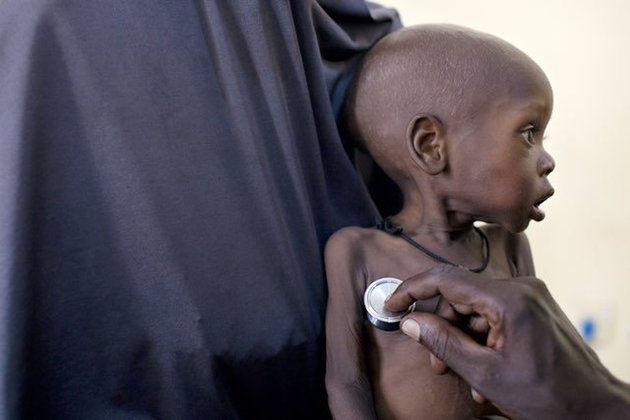CHILDREN WHO ESCAPED ATTACKS OF BOKO HARAM NOW LIVE IN ABJECT POVERTY
As severe hunger takes hold in northeast Nigeria, the U.N. estimates that nearly a half-million children under five will suffer from acute malnutrition this year, and 90,000 may die.
Photojournalist Danielle Villasana tells the stories behind the devastating numbers.
MAIDUGURI, NIGERIA – Izah fled her home in northeast Nigeria in 2015 when Boko Haram militants attacked her village, set her house on fire and shot her husband dead.
She is now a widow raising seven children alone in a displacement camp in Monguno, a remote town in Nigeria’s northeastern Borno State that was recaptured by the Nigerian military from Boko Haram in 2015, but was recently attacked again by the militants.
Amid the famine-like conditions taking hold across parts of Borno state over the past year, lack of food led to severe acute malnutrition for Izah’s youngest child, a two-year-old boy. “It was as if he was going to die,” she said.
He completed several weeks of treatment last fall, and by October his condition had improved.
There is a severe hunger crisis in northeast Nigeria, a region afflicted by years of insurgency by militant group Boko Haram. The ongoing violence has displaced 2.4 million people throughout Nigeria, Chad, Cameroon and Niger, and has exacerbated dire food shortages in the region.
The U.N. children’s fund, UNICEF, warns that an estimated 450,000 children under five years old will suffer from severe acute malnutrition in northeast Nigeria this year, while 90,000 children are at risk of dying.
In December, the U.N. estimated that 55,000 people are living in famine-like conditions in Borno State, and that number could double this year. But many Nigerians are living in areas where no aid agencies can reach, so the true figure may be much higher.
“These are numbers that you don’t see, they don’t exist,” said Arjan de Wagt, UNICEF’s chief of nutrition in Nigeria. “I don’t see that there are many places in the world where you’ve got these kind of levels.”
Although the Nigerian military has recaptured swathes of territory from Boko Haram, the group continues to conduct attacks, including suicide bombings using women and young girls. These often deadly assaults cause people to flee their homes and farmlands in increasing numbers, further destabilizing communities and the local economy, quashing hopes for those already displaced to return home and rebuild the region.
“The scale of displacement is really overwhelming,” said Stephanie Puccetti, the International Rescue Committee’s Senior Emergency Program Coordinator in Nigeria.
This continued insecurity also piles more pressure on local communities in northeast Nigeria, where 75 percent of displaced people are sheltering, according to Puccetti. The years-long displacement of millions of people has further strained the northeast, where food insecurity and poverty have been exacerbated by conflict.
“I think [it’s] striking just how communities have really worked to accommodate these IDPs (internally displaced persons), and to provide support when they have so little. People have been so generous,” said Puccetti.
The lean season, the period between harvests, is approaching soon . Many people in the region are worried about how these struggling communities will cope.
“This is what’s really complex about this crisis,” says Puccetti. “You have an emergency IDP population that requires 12 months a year of support, [and] you also have really vulnerable families who either have returned back home to their areas and are trying to rebuild their lives, or who just never left and are still there who are much more reliant on farming and their own food production.”
In response, organizations like IRC are not only providing medical care but also trying to support the local community in the northeast to boost farming, cope with food insecurity and recover from severe acute malnutrition.
Humanitarian organizations have however struggled to get the necessary funding for a crisis that receives infrequent media coverage.
At an international conference in Norway last month, $672 million was raised to help the region over the next three years. But the U.N. says it needs $1.5 billion this year alone to prevent famine. The U.N. Security Council warned that “ barely enough is being done ” after a visit to the area in early March.
DANIELLE VILLASANA
Mothers take their children, suffering from severe acute malnutrition, to receive further examinations that will help doctors understand what might be complicating their recovery, such as diseases like tuberculosis, malaria or HIV.
“If you don’t provide the proper food, the child that is malnourished today and treated might be severely malnourished again tomorrow,” said de Wagt.
This article originally appeared on Refugees Deeply .
















No comments